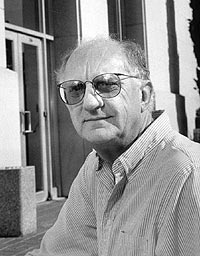Berkeleyan
Pondering 'ubiquitous SQUID'
Faculty Research Lecturer John Clarke to speak on hypersensitive devices from the physics lab
![]()
| 23 February 2005
 John Clarke (Jane Scherr photo) |
First up, on Tuesday, March 8, will be John Clarke, professor of physics and faculty senior scientist at Lawrence Berkeley National Laboratory. One of the world's leading experimental physicists, Clarke is widely considered its foremost expert on superconducting quantum inference devices. Known for short as SQUIDs, these extremely sensitive devices are used to detect magnetic fields in applications ranging from medical imaging to oil exploration.
The much-decorated physicist (past awards include a Berkeley Distinguished Teaching Award, Sloan and Guggenheim fellowships, and two Miller Research Professorships) has devoted much of his long career at Berkeley to both basic science and applied research related to superconductivity and SQUIDs. He will speak on "The Ubiquitous SQUID: From Cosmology to Medicine," at 5 p.m. in the UC Berkeley Art Museum Theater, 2621 Durant Ave.
Later in the month, on March 29, the 92nd annual Faculty Research Lecture series will conclude with a talk by Professor Judith Butler. Look for details on that event in the Berkeleyan in mid-March.

